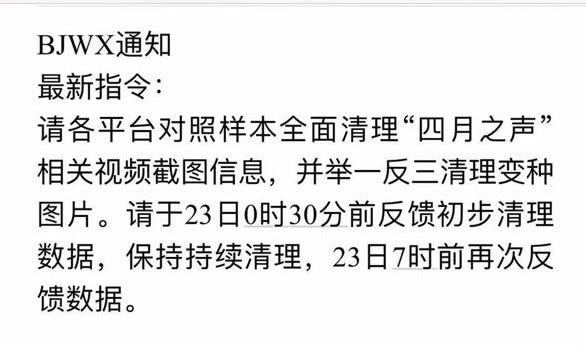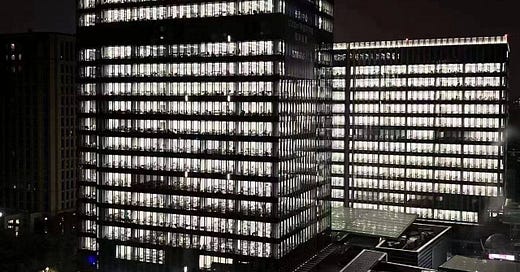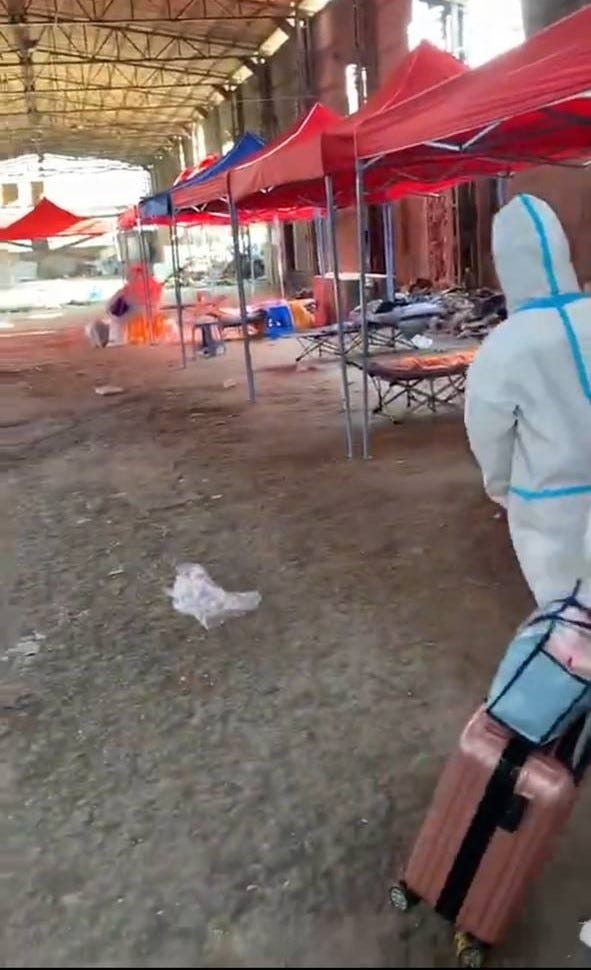Millions raise their online voices to speak out against Sun Chunlan’s disastrous planned economy and medical dictatorship.
View from China with an Austrian School of Economics Perspective
Shanghai has now been under general lockdown since April 1st. The Pudong district, which makes up the east side of Shanghai, started its general lockdown a few days earlier on March 28th. No private vehicles are allowed on the streets without a special permit (通行证). Many housing compounds were on lockdown status for weeks prior to that, meaning that some people have now been confined to quarters for over six weeks now.
As discussed in our earlier piece on Sun Chunlan’s de facto takeover of the Shanghai government, Beijing effectively imposed direct rule on Shanghai, brushing aside Shanghai’s low-impact Covid control policies and attempting to run China’s largest city as a command economy. She also replaced the top officials in the Shanghai public health authority with her own people and took over the 12345 and 12320 call centers. The 12345 hotline is the principal government complaint hotline and in normal times actually works for the most part. The 12320 hotline is the China CDC hotline.
Even though not all 26 million Shanghainese are equally affected, this is an enormous number. Though it’s arguably a fairly comfortable one form of imprisonment for many, it’s still imprisonment, and this is objectively speaking a gross violation of civil rights. All these people are being detained without a court order, and without any justification related to their own behavior.
The only comparable example which comes to mind was the Hubei province lockdown in early 2020, when most of the 57 million people in Hubei province were subject to similar restrictions lasting almost two months.
If the Western sensationalist press is to be believed, Chinese officials in Shanghai are killing all/some/an unspecified number of pets, even though only one such case has been documented. We are also told that vast numbers of Shanghainese are starving. And that there are crowds of people breaking into stores to obtain food. Countless videos showing conflicts with people dressed in white blue striped costumes are circulating across Western social media.
Some people are indeed short of food, especially those who do not live in gated housing compounds. In many areas Sun Chunlan’s deliveries have been very irregular, and in some cases there have been reports that they didn’t always reach the intended recipients. However, in cases where people ARE starving, it’s mostly not because food is completely unavailable, but rather because not everyone can afford to pay the sky-high prices being charged for deliveries, or because they have no way to purchase gas canisters to cook it. Yet another example of the failures of central planners, who doubtless cannot imagine that not everyone has a stove connected to a limitless supply of natural gas. Chinarrative’s recent stories about the fate of migrant workers Hu Changgen and Li Long are good examples of this reality.
And yes, many don’t end up getting the food that they would like to get. Or the basics like ginger, garlic and soy sauce. Instead they are getting Oreos, spam, random assortments of vegetables and occasionally meat – not all of which is edible. And the millions of Shanghainese used to eating takeout essentially all of the time are getting a lot of unexpected practice at cooking. This is all par for the course in a command economy. You get irregular deliveries of stuff you don’t want while being short of essentials you need and paying sky-high prices to fill in the gaps.
And yet, as terrible as these realities are, for most these are not the most disturbing things going on.
What really grates at people’s nerves?
Uncertainty. Not knowing when you will end up testing positive and be whisked off by one of the commissar’s white costumed goon squads in the middle of the night. If you don’t agree, that’s when they typically come, like the NKVD secret police back in the Soviet Union. And not knowing what will happen to your children, your elderly parents and your pets if / when that day comes.
During World War Two, the United States set up concentration camps for Americans of Japanese descent. Approximately 120,000 Japanese and Americans of Japanese descent were deported from their homes and confined there for the duration of the war. They were held in 22 camps scattered across the United States.
In tiny Shanghai by contrast, after only three weeks of rule from Beijing by Sun Chunlan, over three times as many people have been forcibly sent to her “makeshift hospitals” which are anything but hospitals. As of now, over 470,000 people in Shanghai have tested positive for Covid-19, with this number increasing by approximately 20,000 every day1. According to Sun’s “Dynamic Zero Covid policy” (动态清零) all of them need to pass through the commissar’s newly built fleet of camps. On April 21st, the South China Morning Post estimated that there are approximately 160,000 camp inmates, with roughly the same number of people entering and exiting each day.
To provide an additional point of comparison, the Soviet Union also maintained a system of internment camps which reached far higher numbers — albeit over the course of several decades. According to research published in 1993, by May 1940 the Soviet Gulag system consisted of a total of 53 camps, 423 “labor colonies” and 1.3 million inmates. Most of the these were dismantled in 1953 upon the death of Joseph Stalin.
China adopted this system from the Soviet Union in 1949, leading to a system of labor camps (劳改) and re-education camps (劳教). These gradually fell into disuse after approximately 2000, and were finally formally abolished on December 28, 2013 by the new Xi Jinping government (劳教废止).
What differentiated these camps from jails and prisons is the fact that they tend to effectively exist outside of the formal criminal justice system. Within the context of the criminal justice system, in most countries (including China) people cannot be held indefinitely without being accused and convicted of a crime. In China the normal limit for detention is 15 days, or in exceptional circumstances 37 days. If the state cannot formally indict the detained person within that period, he must be released. While there are always ways to bend the rules, for the most part these basic conventions are respected.
It’s true that Sun Chunlan’s Shanghai camps are not labor camps. However, they are certainly concentration camps, and they are not voluntary. And aside from a regular supply of food, conditions are in many cases pretty miserable, especially in the transit camps (中转站). There is little to no privacy, no showers, no medical care and no place to lock up valuables. Some have usable Internet; others don’t.
It’s also true that inmates typically stay no longer than three weeks. However, if we assume an average stay of 10 days, this is equivalent to about 200,000 people, or about 0.77% of the population of Shanghai. Applied to all of China this would be over 11 million people. This is far more people than all prisoners in the entire rest of the world combined.
Literally ANYONE is subject to deportation to these camps. Sun Chunlan is very democratic – she has decreed that there are to be no exceptions. Back in early April, there were exceptions for certain groups, such as foreigners, the elderly, very young children and those with special medical conditions. These have now all been abolished. It doesn’t matter if you are a CEO of a major company, fresh out of the womb, or a 95-year old retiree with a heart condition and diabetes. All are to be deported immediately after one positive PCR test. No double checks.
The infectiousness of the Omicron variant of Covid-19 (R0) has been estimated to be as high as 10, meaning that on average each infected person infects ten others. Given this extremely high number, most people have to assume that sooner or later at some point they, their children and parents are likely to end up in one of the camps, with all the associated effects on pets and family members left behind.
That said, it’s important to note that this doesn’t mean that she always gets her way. Not only is stubborn resistance to this absolutist approach to be found among the deportees, but also among the officials tasked with implementing them there is widespread reluctance to enforce policies widely viewed as inhumane and irrational.
Rule by Slogan
For all their faults, at least in the past 20 years, both the national Chinese government and the major provincial governments have for the most part been seen to have governed fairly rationally and with limited ambition. This was a big change from Mao Zedong times when government seemed to primarily rule by slogan.
Despite many problems, bit by bit, life improved. The trains became sleeker, the roads better paved and the skies bluer. Most urban Chinese accumulated substantial wealth thanks to business-friendly policies, high savings rates and exploding real estate prices. As discussed in an earlier article on Society & Quality of Life, at least until recently most Chinese did not perceive the government as playing a particularly prominent role in their lives. Instead, government (and especially the national government) was widely perceived as a far-away, and for the most part benevolent and rational decision maker. In fact, until 2020, China’s central government (according to the Edelman Trust Barometer) enjoyed the highest level of popularity of any government in the world throughout the previous decade2.
Where there was interaction with government, the government typically packaged its demands in a way that – at least on the surface – seemed grounded in some kind of rationale. The same was true for its initial Covid policies. Though of questionable necessity, at least they delivered on their promise and allowed most people in China to return to normal fairly quickly. In other words, these policies were sold as being rational, grounded in science, and they were mostly perceived as such. Our previous article on China’s Covid regime discusses this, as well as the origins of the lockdown policies implemented.
Now it seems that we are back to the old socialist style of rule where slogans have replaced rationales. Sun Chunlan’s current core slogan / policy is Sì-yīng-sì-jìn (“四应四尽”). Being borderline meaningless, slogans are often hard to translate, but this one could perhaps be summarized as the “4 shoulds”, namely:
应治尽治,应检尽检,应收尽收,应查尽查。
This roughly translates to: Those who need treatment should be treated, those who need to be tested should be tested, those who need to be deported should be deported (to her camps) and those who need to be checked should be checked.
Since there is effectively no treatment being offered, on the ground this boils down effectively to: Everyone should be tested regularly and everyone who tests positive should be immediately whisked off to the camps.
Under China’s new “Covid über alles” regime, slogans are once again everywhere. And they’re all about Covid. Here’s one for new camp arrivals:
“ 面对疫情信心是长效的疫苗” (= “When confronting Covid, confidence is the best vaccine!”)
And one for the bowling alley:
“抗击疫情人人有责” (= “When fighting Covid, everyone must take responsibility.”)
Government by slogan tends to go hand in hand with a complete lack of interest in the connection between those slogans and reality, and this is precisely what we see with Sun Chunlan’s regime in Shanghai.
Recently it was announced that special arrangements had been made to permit Tesla and several other prestigious manufacturers to resume production. But what about their suppliers? And their suppliers’ suppliers? Are they also included in the master plan?
What happens if your computer breaks and you don’t have a computer repairman at home? What happens if you need a new power adapter? Even for those for whom it’s an option, so much for working from home without power. This detail didn’t make the master plan.
Workers caught outside their homes at the point of lockdown have often ended up homeless. No thought was given to them, either.
We are told that the point of mass testing is to stamp out the virus. Yet the more tests are carried out, the more people get infected. Many including medical experts suspect that transmission is taking place during the mass tests. Here again, there seems to be no connection between reality and the slogans.
Countless people are being deported after recovering from an infection, despite testing negative using the antibody test. Upon arrival in the camps, many of these immediately test negative via PCR. Since it can take up to 2 or 3 days to be moved from one of the temporary holding areas to the actual camps, and two successive negative PCR tests in the camps are required to get your graduation papers, even in such cases realistically 7 days are the minimum turnaround time to get out again.
Many fully meet the conditions for home quarantine, and yet still get deported anyway.
Prior to April 9th, people deemed “close contacts” were typically deported to temporary holding areas (sometimes repurposed schools, as discussed here, sometimes semi-exposed open-air camps, sometimes hotels), where they were housed in close quarters with other close contacts. Some of these are always infected, so if you weren’t yet infected beforehand, you had an excellent chance of getting infected after arrival. Many people realized this, often leading to fierce resistance. Those who resisted were sometimes sent to hotels instead. According to some reports this policy is scheduled to be resumed in the near future.
Even 94-year olds are being deported by force in the middle of the night and dumped on cold floors upon arrival. One sickly 73-year old was forcibly deported at 4am in the morning and expired on the way to the camps. We will share a few of these stories over the next few days.
Resistance
Resistance to these outrages and irrationality comes in at least two forms: mass disobedience and online criticism in comments and social networks.
Mass disobedience comes mostly in the form of a refusal to participate in the mass PCR tests. Every day more and more people refuse to participate. In one Xuhui housing compound, the entire compound boycotted the tests. The threat to turn all their QR codes red fell on deaf ears. The result: They were rewarded with extra food deliveries. The lesson: Resistance pays.
The same seems to be true when it comes to resisting deportation. Those who resist, especially those with families, often end up in better facilities. Some even end up in apartment units with private kitchens and bathrooms.
Support for Sun Chunlan’s policies in Shanghai appears to be very low, with countless testimonies like this stinging one from a German resident refusing to agree to deportation reverberating across the Chinese social networks. Quote: “Your system is the most ridiculous I have ever experienced in my entire life. My children in kindergarten are more organized than this. […] The policy does not work. It’s a disgrace for this country and for your government.” Hundreds of thousands of Chinese clearly agree with him.
Last night (22nd-23rd) an online battle took place, with a collection of audio snippets entitled 四月之声 (“Voices of April”) made by Shanghai filmmaker 永远的草莓园 (“Strawberry Fields Forever”) being shared millions of times in countless variants to overwhelm the censors. The censors did not seem able to keep up3.

Moreover, this open disapproval is not just among the peasantry. At this point, Sun’s policies also have very little support in the medical establishment. Zhong Nanshan (historically China’s equivalent of Tony Fauci), Zhang Wenhong, his Shanghai counterpart, as well as many other prominent figures from the medical establishment have come out in opposition to Sun Chunlan’s policies. All of them were censored, though not before their opinions reached millions.
Thus far both the commissar and her boss are sticking to their slogans. Meanwhile the economy is hemorrhaging and they have lost the support of their own ‘experts’. Something has to give.
Links to Sun Chunlan’s latest pronouncements can be found in the comments.
There is an update to the story on “Voices of April” here:
Today’s reported numbers are up by 32% since yesterday, rising from 17,629 to 23,370 new cases.
Western readers who have read too many articles about China’s alleged social credit system may find this hard to understand. Our deep dive into the topic provides some answers:






The Global Times article from today is even better:
"Shanghai has entered a "decisive battle" to stamp out coronavirus infections within communities since Friday, as the local government announced measures to double down on quarantine measures in residential compounds and scale up nucleic acid tests."
How is it possible to further "scale up" PCR tests?!
Then it goes on:
"The Shanghai government held a meeting on Friday night in which it vowed to implement the central government’s guidance on Shanghai’s antivirus battle, and to eliminate viral infection within communities as soon as possible. It also promised to take a more forceful approach to implement a zero-COVID strategy across all aspects of the battle with the virus."
"More forceful"...
Now it's serious. No more Mr. Nice Guy when dealing with this virus.
https://www.globaltimes.cn/page/202204/1260045.shtml
Given that even the WHO admitted that the PCR test is NOT reliable, and given that I don't believe that China 'politicians have been bought by Bill Gates (they didn't give the mRNA poison to their people) I wander why this was permitted.
BTW I love Chinese people way of resisting 😊🥰